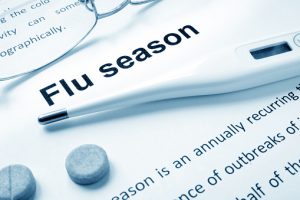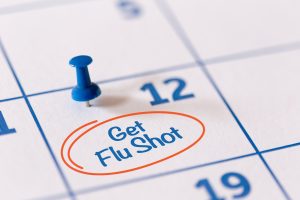
DOVER — Statewide flu totals in Delaware decreased for the third week in a row, according to the Division of Public Health (DPH). During the week ending March 10, DPH reports 290 laboratory-confirmed flu cases, down from the prior week’s total of 381 confirmed cases. The latest numbers increase the total number of influenza cases for the season to 7,433. DPH is also reporting one additional flu-related death, a 62-year-old female from New Castle County with multiple underlying health conditions, bringing the number of flu-related deaths for the 2017-2018 flu season to 31.
“We’ve unfortunately lost another Delawarean to the flu this season and we express our condolences to her family,” said DPH Director Dr. Karyl Rattay. “Although flu cases have dropped again, that is not a reason to take flu lightly. Flu germs can circulate even into the summer months, so it is crucial to continue taking preventive measures against influenza, such as social distancing and handwashing.”
Social distancing means that if you are sick, do not go to school, work, or other social functions until you are fever-free (temperature less than 100 degrees F; 37.8 degrees C) for at least 24 hours without fever-reducing medication. Wash your hands frequently and sneeze or cough into a tissue which you immediately dispose of. If you don’t have a tissue available, cough or sneeze into your inner elbow.
DPH emphasizes the importance of calling your primary care provider at the first sign of illness and taking antivirals, as directed, if prescribed. You should go to either your physician or a walk-in clinic rather than the emergency room when symptoms are non-life threatening. People who are extremely ill with symptoms such as trouble breathing, bluish skin color, fever with a rash, dizziness, or severe or persistent vomiting should seek out immediate medical help.
While the overall number of flu cases have gone down, DPH reminds Delawareans that as long as the flu virus is circulating in the community, there is still time to get a flu shot. DPH offers ongoing free flu shots at five State Service Centers. For more information about free flu clinics including dates and times, visit http://dhss.delaware.gov/dhss/dph/fluclinics.html. To shorten your wait time, you can complete the vaccination form found at the bottom of the webpage and bring it with you.
For more information about flu surveillance in Delaware, read the weekly flu report at http://dhss.delaware.gov/dph/epi/influenzawkly.html. For general information about the flu, visit flu.Delaware.gov.
A person who is deaf, hard-of-hearing, deaf-blind or speech-disabled can call the DPH phone number above by using TTY services. Dial 7-1-1 or 800-232-5460 to type your conversation to a relay operator, who reads your conversation to a hearing person at DPH. The relay operator types the hearing person’s spoken words back to the TTY user. To learn more about TTY availability in Delaware, visit http://delawarerelay.com.
Delaware Health and Social Services is committed to improving the quality of the lives of Delaware’s citizens by promoting health and well-being, fostering self-sufficiency, and protecting vulnerable populations. DPH, a division of DHSS, urges Delawareans to make healthier choices with the 5-2-1 Almost None campaign: eat 5 or more fruits and vegetables each day, have no more than 2 hours of recreational screen time each day (includes TV, computer, gaming), get 1 or more hours of physical activity each day, and drink almost no sugary beverages.
 DOVER — The number of laboratory-confirmed flu cases in Delaware is skyrocketing and one-week totals are now surpassing the highest single-week totals from last flu season. The Division of Public Health (DPH) reports that there were 650 lab-confirmed flu cases recorded between January 21 and January 27. The highest single-week total in the 2016-2017 flu season was 571. The most recent weekly number brings the total number of flu cases to 1,950 for the 2017-2018 season. The surge in flu cases comes with additional news that a fourth person has died of flu-related complications in Delaware. An 82-year-old Sussex County man, who had several underlying health conditions, passed away last week at a local hospital. Of the four flu deaths in Delaware this season, two have been Sussex County residents and two have been New Castle County residents.
DOVER — The number of laboratory-confirmed flu cases in Delaware is skyrocketing and one-week totals are now surpassing the highest single-week totals from last flu season. The Division of Public Health (DPH) reports that there were 650 lab-confirmed flu cases recorded between January 21 and January 27. The highest single-week total in the 2016-2017 flu season was 571. The most recent weekly number brings the total number of flu cases to 1,950 for the 2017-2018 season. The surge in flu cases comes with additional news that a fourth person has died of flu-related complications in Delaware. An 82-year-old Sussex County man, who had several underlying health conditions, passed away last week at a local hospital. Of the four flu deaths in Delaware this season, two have been Sussex County residents and two have been New Castle County residents. DOVER – Lab-confirmed cases of influenza in Delaware have increased significantly over the last few weeks. The week ending Dec. 30, 2017, saw 142 confirmed flu cases, an increase of 48 percent over the previous week. For those who have not yet gotten their flu vaccine this season, the Division of Public Health (DPH) is providing another opportunity for Delawareans to get a shot at its annual Legislative Hall flu clinic.
DOVER – Lab-confirmed cases of influenza in Delaware have increased significantly over the last few weeks. The week ending Dec. 30, 2017, saw 142 confirmed flu cases, an increase of 48 percent over the previous week. For those who have not yet gotten their flu vaccine this season, the Division of Public Health (DPH) is providing another opportunity for Delawareans to get a shot at its annual Legislative Hall flu clinic.